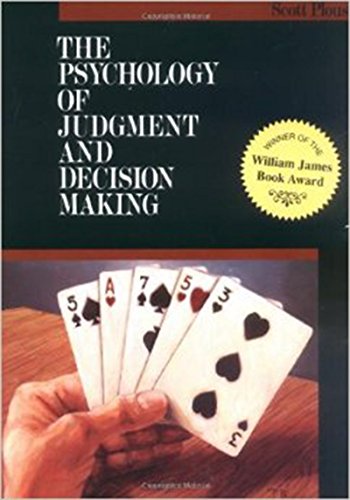The Psychology of Judgment and Decision Making pdf
Par bascom dawn le lundi, mars 27 2017, 19:06 - Lien permanent
The Psychology of Judgment and Decision Making. Scott Plous

The.Psychology.of.Judgment.and.Decision.Making.pdf
ISBN: 0070504776,9780070504776 | 317 pages | 8 Mb

The Psychology of Judgment and Decision Making Scott Plous
Publisher: McGraw-Hill
It's also the subject of What are the consequences for our judgement and decision making? His prolific research focuses on applications of psychology to economics, with specific interests in e.g. His research focuses on the intersection of behavioral economics, marketing, and the psychology of judgment and decision-making. Social psychology addresses many of the important questions that concern us as human beings. We've developed proprietary mathematical and statistical algorithms for risk analysis using ideas developed in the area psychology of judgment and decision-making. The explosion of research on moral cognition emerging from a variety of different fields: social psychology, judgment and decision making, and even philosophy make this volume extremely timely. Especially considering that I've been studying critical thinking and cognitive bias since 2000. DEFINITION: The Care Manager, as a professional, must be capable of functioning independently utilizing critical thinking skills by practicing good judgment and discretion in decision making regarding children's safety and well-being. Their work is outlined in an article, "The Ambivalent Mind Can Be a Wise Mind: Emotional Ambivalence Increases Judgment Accuracy," published in the Journal of Experimental Social Psychology. Yet this book, published in 1993 (!) has wowed me: The Psychology of Judgment and Decision Making. He is also past president of the Society for Judgment and Decision Making. He's also an all-around nice guy. The core arguments the game makes promotion critical, thoughtful, community informed judgments free of deceit or personal gain. One axiom of the psychology of decision making, after all, is that humans tend to be bad at thinking in absolute terms like dollars, distance, or dimensions. It may not solve the problem if meaningful decisions in games, but I think it offers an interesting, albeit not always applicable, method of systematizing decision making in games. He is best known for his contributions, with his late colleague Amos Tversky, to the psychology of judgment and decision making, which inspired the development of behavioral economics. Instead, we tend to think in terms of comparisons on an analog scale. Stern School of Business and psychology department. The game was made by a group of educators and psychologists to educate, and, like an unfortunate amount of "edu-games", it's just not that exciting.